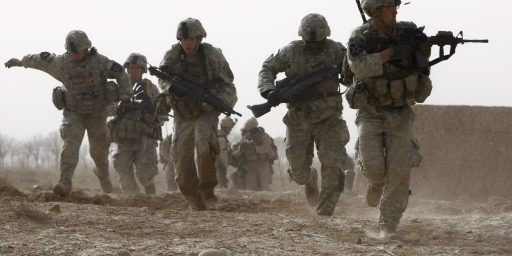Blogging in the Combat Zone
James Dunnigan reveals the “dirty little secret” that “The Troops Are Blogging in the Combat Zone.” That this is a secret is rather amusing, since we’ve all known that for nearly two years. What is interesting, though, is Dunnigan’s analysis of the information security angle:
The U.S. Department of Defense is having a problem dealing with soldiers in combat zones who are using the Internet. One of the most accurate sources of information about military operations in Iraq and Afghanistan comes from the troops themselves, via email and blogs written by soldiers. This is nothing new, as soldiers have long been writing home about what they are seeing and doing. These messages were not censored much until World War II. But by the time the 1991 Gulf War rolled around, there was cheap international phone service, which was too difficult to censor. So the troops were just warned to be careful what they said, lest they give the enemy any useful information. That worked, not just with calls home, but also with troops talking to journalists. This was important, because in 1991, some reporters had portable satellite dishes for the first time, and could report, live, from just about anywhere. Between 1991 and 2003, the Internet arrived, and spread to everywhere, including battlefields. Even during the initial invasion of Iraq in 2003, some troops had Internet access, and that access grew the longer American troops were there. First came a growing flood of email, followed by bloggers and home pages updated with pictures and text from the front. Unit commanders, especially battalion commanders, found that the families of the troops liked getting letters from the boss, describing what the troops were doing, and what was being done to keep them as safe as possible.
The only problem with all this open communication was that it was unsupervised. It was only a matter of time before someone, most likely a younger guy, said something someone in his chain of command really didn’t like. That’s happening. Because there is no military regulation covering troop use of the Internet, from a combat zone, it’s uncertain exactly what can be done. The writers are invoking First Amendment freedom of speech issues. But their commanders have military law (the UCMJ) on their side, which is recognized as superceding some constitutional rights (at least for soldiers, who are subject to military law when on active duty). Troops who post, either in a blog or email, information that is obviously useful to the enemy, can quickly be arrested and court martialled. But there are even degrees of what is “obviously useful,†and most of what gets written up in email and blogs is nowhere close to that. In fact, the military recognizes that email and blogs are not only good for troop, and family, morale, but also provides a more accurate view of what’s actually going on in the combat zone. Many media outlets report what they want to be happening, not what is happening. The emails and blogs from the front have provided an increasingly embarrassing counterpoint to the mass media version of reality over there.
So for the moment it̢۪s a standoff. Some commanders will have to deal with the aggravation of seeing blogs saying uncomfortable, but not indictable, things. There̢۪s just too much to lose by trying to lean on troop use of the Internet.
Troops can certainly be trained to be careful about what they blog. After all, they have every incentive to ensure that they don’t give the enemy useful information. The bottom-up, real time spread of information about what’s really going on on the ground is immensely valuable. It’s good to see that the brass isn’t overreacting to what’s essentially a non-problem.




The problem isn’t so much blogging from the front during times of war, but blogging from the base during the easy times of peace. When warriors are in a deterrent rather than fighting role, their morale easily takes a dive and they become disgruntled (been there, done that). Lousy food and stupid orders are no longer something you ignore because you are fighting for truth, justice, and the American way. Instead they become major sources of contention.
Of course, the military knows that right now there is no voice more powerful than that of a soldier on the front lines (even you REMFs, you guys are all on the frontlines as far as I’m concerned). Look for crackdowns to come when the country starts backing off from a war time posture.
On the other hand, you do have to wonder how the Revolutionary War would have turned out if Washington’s 5-year quagmire of a war (with but one or two significant victories) against the rightful and lawful European-style governement of the enlightened British, had been blogged.